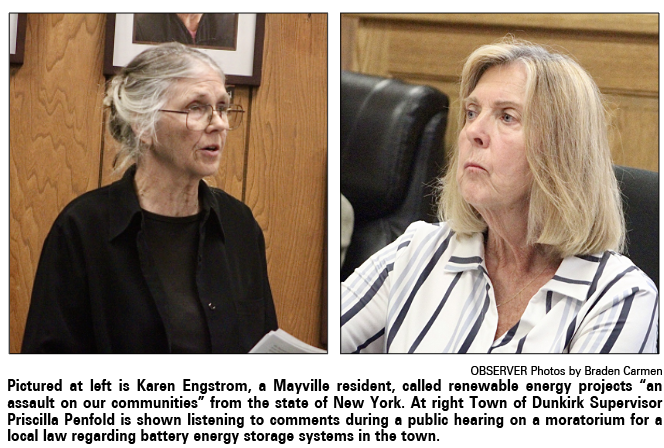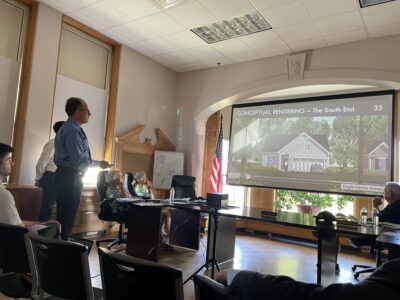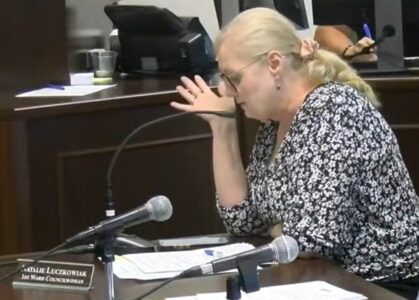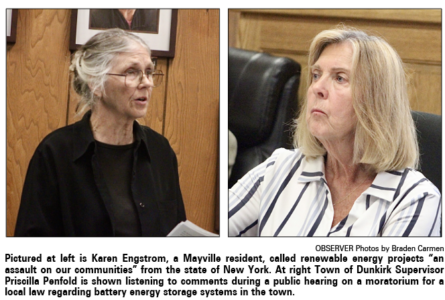Time to ‘evaluate’ : Town enacts battery storage moratorium

Tuesday evening, the Town of Dunkirk held a public hearing to field comments regarding battery energy storage systems. After multiple speakers on both sides of the issue, the Town Board enacted a six-month moratorium to allow for adequate time to draft a local law defining the rules and regulations on such systems in the town, or if they are even permitted at all.
As of Tuesday’s meeting, there is no battery energy storage system (BESS) project proposed to the town of Dunkirk. Still, with the matter garnering attention throughout the state, Town Board member Phil Leone urged his fellow Board members to consider drafting a law to define and/or restrict such systems in the town.
“I think we need to address our existing battery energy storage system law,” Leone said at Tuesday’s hearing. “That’s the reason that I made the motion for a meeting to pass a moratorium, so we can take a look at that. A lot of things have changed and I think it’s something we really need to do. All the other towns are doing it.”
Town Board member Shari Miller shared her main concern with BESS in the town is the potential stress on the town’s fire departments. Board members Jean Crane and Bob Price also shared the concerns expressed by Leone and Miller.
Following the Board’s comments, the public spoke for over 20 minutes on the matter, with most of the comments being from guests who are not residents of the town.
One of the few town residents to speak was Cathy Snyder. She was under the impression that a project was proposed in Dunkirk, but after learning there was no proposal before the Town Board, she still shared her concerns with BESS on two separate occasions during open public comments. Snyder mentioned fires in Spain and California, and claimed that while the Environmental Protection Agency (EPA) stated there were no negative effects on the impacted areas from the fires, she did not take their word for it.
“The EPA is notorious for not finding anything,” Snyder said. Snyder called it “foolhardy” to place a BESS in a residential area.
Minutes later, another resident, Sue Hazelton, shared her concerns with chemicals from potential fires polluting the town, especially if they enter Lake Erie.
Adam Rizzo, a representative of Solar Liberty, was the second member of the public to speak. He stated that Solar Liberty — the operator of a solar project in the town — does not have a BESS project designed for the town of Dunkirk. Rizzo said that a six-month moratorium is “a good undertaking” for the town to research the matter further.
Rizzo said, “I do believe there is a lot of misinformation out there … to stop the movement of these battery systems.” In explaining the benefits to a BESS, Rizzo added, “They very much hold a place in our future.”
Solar Liberty previously installed a BESS on the campus of SUNY Fredonia next to the solar panels. Since its installation, Rizzo stated the system “has operated flawlessly.”
Rizzo concluded his comments by stating, “I appreciate you taking the time to evaluate this. Please do it with an open mind.”
A representative from Grid Connected Infrastructure, a battery storage development company founded in Ithaca, later emphasized the potential for significant financial benefit to the town in the form of a Payment in lieu of Taxes or Host Community Agreement. The representative said BESS generates very little traffic as they are operated remotely and they are not as visually apparent as other forms of renewable energy systems such as solar panels or wind turbines.
Karen Engstrom, a Mayville resident, shared her strong opposition to BESS during public comments, just as she did at the town of Hanover’s public hearing on a proposed project earlier this year. Engstrom called renewable energy projects “an assault on our communities” from the state of New York. “It’s forcing our little townships … to choose between economic incentives and the safety and security of their community.”
Engstrom defined the state’s emphasis on renewable energy projects as “a government program designed to enrich that coalition of developers, lobbyists, politicians, financiers, landowners, and manufacturers who try to identify this as an industry.”
Mike Miller, a Town of Dunkirk resident, said he supports a six-month moratorium on the matter. He said, “Technology improves every day, and maybe somewhere down the road this would be something we’d all feel more comfortable with, but I don’t think this is the time.”
Town of Dunkirk Supervisor Priscilla Penfold said after 20 minutes of discussion with residents, “This has been valuable information, I thank you for sharing. … This is a great Board, they will do their own research.”
The Board approved the six-month moratorium at its regular meeting, which followed the public hearing. The moratorium will take effect as soon as the local law is filed with the state of New York.
“A six-month (moratorium) is a good start. Hopefully, we’ll be able to look at what we already have in place and become more educated on what we need to have in place to ensure the safety of our residents,” Miller said.






